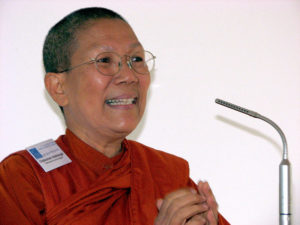…Buddhadasa Bhikkhu’s proposal for a dhammic socialism offers a case in point. His diagnosis of the root cause of the social problems that Thailand faces is certainly correct at the most fundamental level. Not only Thailand’s, but all humanity’s troubles are rooted in our “me” and “mine” ways of thinking. From this it follows that the ultimate solution to our problems is selflessness. Each must live for the benefit of society, placing the common good above personal interests. However, in this proposal for a dhammic socialism, Buddhadasa does not foreground the problem of sexism nor does he connect gender issues with other social issues, and herein lies a problem. From a feminist perspective, Buddhadasa’s prescription for Thailand’s social ills elides the situation of Thai women, particularly poor Thai women. It overlooks the problem that selflessness means one thing in the context of dharma practice, but can mean quite another thing as an imposed prescription for social behavior. For many Thai women, selflessness is already too much a way of life-but theirs is not a liberating selflessness born of realization of emptiness, but is rather a self-negating selflessness that is born of sexist social attitudes which degrade women’s inherent value. As Dr. Kabilsingh explains, views of women’s mental and physical inferiority, passed down and perpetuated over the generations, teach that women have little worth apart from the worth they gain by serving their families and pleasing men. Self-effacing behavior becomes a primary basis upon which Thai women establish their social worth. This devaluation of woman is not unrelated to other social problems in Thailand. For example, Dr. Kabilsingh argues that this pattern of socialization plays into the thriving sex trade. When a family falls into debt, it is not uncommon for elder daughters to be asked to “sacrifice”f or their parents and younger siblings, that is, to enter into the sex trade. And the girls, having internalized the view that their worth resides in their willingness to sacrifice for others, then become prostitutes out of a sense of duty or obligation to parents. The point here is not to accuse Buddhadasa of holding sexist attitudes himself; certainly he envisions that men and women will practice selflessness equally under dhammic socialism. But rather the point is to question whether the promotion of selflessness as the highest social virtue would help to free Thai culture from sexist social attitudes. As his diagnosis of Thailand’s social problems ignores the problem of sexism, his prescription does not treat it.

In the literature on engaged Buddhism coming out of Thailand, discussion of the question of women is usually dealt with as a separate topic and is focused on the status of religiously committed women. But a gender- nuanced analysis of Thailand’s social ills, informed by awareness of the way issues interconnect, would have to treat seriously the co-arising of sexist attitudes toward women with other dimensions of Thai culture, including not only the traditional exclusion of women from the samgha, but also the rise of consumerism, the erosion of community life, and other social problems that Buddhadasa decries…
…Feminist theology has always been suspicious of calls for selfless sacrifice, because historically, the ideological valorization of selflessness has served as a mechanism to maintain the system of female subordination. For women and others who have been socialized to efface their own needs in service of others, “to own one’s life,” to claim the self-authority to assert one’s own needs as significant, “is to creatively overcome dispossession.”
Feminist theology tends either to avoid discussion of the need for sacrifice in activist work or to deny that it is needed at all. Starhawk, for example, argues that “Gandhi’s ideas don’t always fit for a lot of us, particularly for women. Gandhi said we have to accept the suffering and take it in. Women have been doing that for thousands and thousands of years, and it hasn’t stopped anything much-except a lot of women’s lives.” She argues that acts of self-sacrifice serve only to “absorb” violence rather than to stop it or to transform it and that there are other ways to transform the hegemony of the structures of power-over, ways that offer self-enhancement rather than demanding self-sacrifice. In- deed, she says, “the actual unsung truth about a lot of organizing is that it feels really good, and that’s why people do it.” Such optimism might appear terribly naive to those who struggle for human rights and peace in situations of political oppression where concerned activism is accompanied every day by the threat of arbitrary imprisonment, torture, and /or death.
Source: Visions of Interconnectedness in Engaged Buddhism and Feminist Theology. By: Alice A. Keefe
